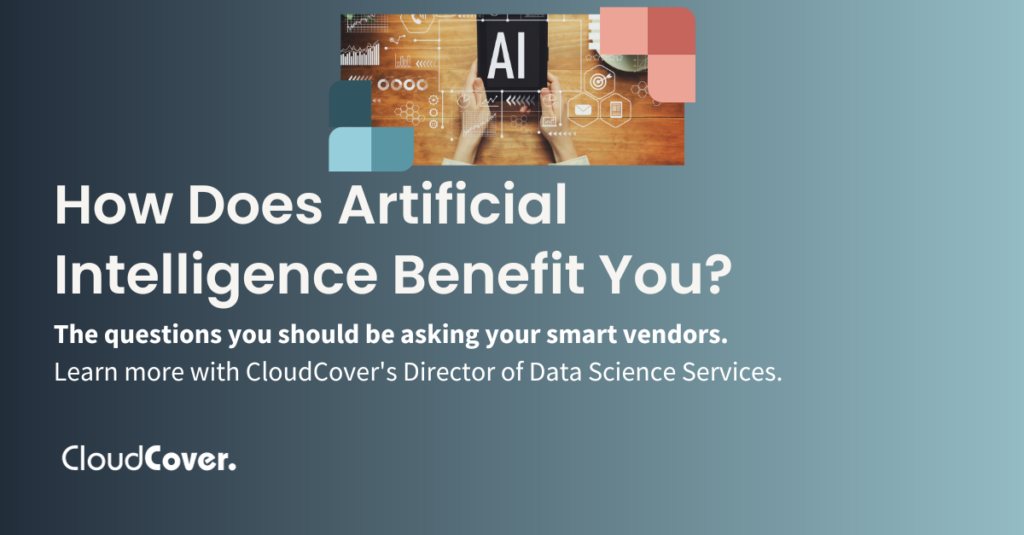
How Does Artificial Intelligence Benefit You?
- 5 Minute Read
- Artificial Intelligence
In this post:
Artificial Intelligence Is Not Unique
“Faster.” “Smarter.” “Better.” Vendors that claim to use an artificial intelligence (AI) to power what they do are rife with these adjectives. But what they often fail to do is explain how the artificial intelligence they are using creates a customer benefit.
The reality is that some smart companies use AI and some not so smart companies also use AI. What’s important to understand is that AI is not a unique offering by itself. Any company that uses it as if it is a self-explanatory offering owes a larger explanation to their customers.
How Does Artificial Intelligence Benefit You?
Think about the problem AI should solve the next time you sit in on a company’s demonstration of their AI offering. Ask yourself, “How does this solve my problem?” Most AI development is meant to solve a problem but keep in mind that not all problems are your problems. Sometimes a problem is identified but in reality, it has little to do with what you would perceive your problems to be. As impressive as the work behind an AI powered solution may be, if it’s only helping the vendor to do their own job more easily, then it’s not really benefiting you as a customer.
Come prepared with a list of problems you’re looking to have AI companies solve for your business. It will save you time and ensure the AI being marketed really benefits your specific needs. The biggest ones to keep in mind should be these:
- Has the AI powered company you are evaluating accurately identified your problem? (And if not, how well do you think they’ll do in understanding what that is?)
- Does their AI produce a sufficient solution?
The question is not, “Is artificial intelligence beneficial?” Instead it should be, “What is the real value of artificial intelligence for your specific needs?”
Solve the Right Problem
Sometimes companies become so excited about offering AI within their own operations that it gets put into marketing materials without anyone asking, “Why should the customer care?” Regardless of how much time and how many things a company’s AI can do, as a customer if they forget to solve your problem, you should care.
A lot of the marketing I’m seeing around AI solutions are similar to the approach some insurance commercials have taken. Have you seen the commercials where an insurance company promotes their ability to send an adjuster to your next accident? I’m struck that for all the advertising spent celebrating this new ability, they never seem to talk about why this feature is a benefit for you, their customer.
Instead, the audience is given the impression that an onsite adjuster is supposed to bring some benefit to a problem that really hasn’t been identified in the first place. This is likely because what we’re seeing is solution to a problem the insurance company spent a lot of time and money in solving.
It was likely a large investment of their time and resources and the solution brought them some great value as a company. But it was never really something that their end users would see as an investment because it was just never really the end users’ problem to begin with.
It’s like showing up to someone else’s birthday party in your Halloween costume because you love Halloween. You’re celebrating the wrong thing for the wrong reasons. The insurance company fixed one of their own problems and then spent a lot of time trying to bend and twist their solution to convince you that it is a benefit for you. They aren’t the only industry doing this.
Celebrate the Right Intelligence
I recently sat through a leading maintenance provider’s marketing demonstration on how their AI manages predictions. Through predictive support, they can assess the kinds of failures and probability of failure their users will experience. This allows them to build inventories with accurate parts assessment.
The presentation ended without any explanation of a problem. This is partly because naming the problem could, when read in a certain light, make it seem like their previous services were lacking (even if their solve was driven around the goal of continual review and improvement on existing processes).
This is a tricky situation; this is a large reputable company that you are undoubtedly familiar with. They cannot broadcast the problem without casting negative attention on themselves. The problem is that they have not accurately assessed what parts need to be employed within a local stocking location. They most likely have spent lots of money on parts that were unnecessary while not having necessary parts available. I was left with the impression that they were marveling at the amount of money they will save themselves through smarter inventory planning.
However, how does that benefit you, as their customer? If they continue with this process and tell you that they can now add the correct parts to inventory, this negatively reflects on the service they have been delivering. How is that still your problem?
Watch for AI as a Sales Gimmick
This is a classic problem with the ‘new and improved’ marketing of products. If your company’s new product is vastly improved from the old and I’m still using your old product and spent a lot of money on it, you just announced that I’ve been and am still paying for a subpar product. Another good question would be: Are you paying more to use a company’s AI service so that they can continue to promise you the same delivery arrangement you originally paid for? What’s the math on that one look like?
Companies are beginning to charge for the use of their AI services. This can reduce AI to a sales gimmick. If it’s true that AI offers smarter, faster, and better services, wouldn’t it be great if it was vastly superior and cheaper? Shouldn’t it be easy to see the benefits of using it? This is why context is key. AI is not and should not be sold as a singular, unique offering. Context on what problems an AI was created to solve or improve on must be sold with it.
AI’s Continued Growth
None of that is to argue against the sophistication of the tools we use today. They are incredible! Many people are using Machine Learning and Deep Learning in amazing ways. These tools are creating enormous value and will continue to do so.
But I want to be clear – unless a company can clearly explain how their AI produces customer value, there probably is not as much value as what is being promoted. If your specific problems were not part of their estimate when they talk about the value of their AI, then the overall sum is lacking. Don’t be afraid to ask, “Has the AI powered company you are evaluating accurately identified your problem?”
AI’s Ability to Service Customers’ Growth
At CloudCover we have worked to produce clear value from the AI we have developed. We started by building large datasets to analyze every aspect of Service Delivery putting the customer at the center of our equation. From quote requests to case closures, we’ve analyzed an enormous amount of data to define and identify customers’ problems.
We used this data to target AI solutions that ultimately solve customers’ problems, not just our own. We’ve been successful at using AI to build practical solutions to practical problems. For example, we observed that the majority of customers request 4-hour support for all of their equipment, regardless of if it is required.
What we also found was that, despite asking to be signed up for 4-hour support, most customers did not actually require a 4-hour part. In fact, when we had our AI analyzing the data for efficiency suggestions for our customers, what it found was that customers were paying for 4-hour support but delaying the service to a longer completion period for various reasons.
This delay from the customer is an expensive problem for the customer. Four Hour Service is much more expensive than Next Business Day Service (NBD) and our AI was able to tell us that many of our customers were paying for more expensive services when their behaviors suggested that their needs could be met with less expensive options for the same results.
Based on our AI – built to look for efficiencies for our customers – we built a new solution, offering Smart Quote Options for customers to take advantage of.
AI’s Continued Value Is Shaped Through Partnerships
We also developed a neural network to measure predictive failures by clustered location. This has allowed us to anticipate the kinds of failures we should expect at every customer location. Through prediction, we produce a Smart Quote, filtered through Risk Assessment. We’ve used our own AI to recognize opportunities where we can offer multiple smart solutions to customers and for customers, instead of one static 4-hour quote.
Layering quotes with these kinds of smart options gives us a valuable opportunity to have to an informed conversation with the customer about things that matter to them. Our AI was built to gather information that is defined by Machine Learning with the customer at the center. Its focus on solving customer problems, allows CloudCover to offer alternatives to customers. We think it’s important for customers to understand the competencies they receive when an is AI purpose-built to service their needs as its primary purpose. AI is not a unique offering. AI built around how to solve your problems as a customer is.
Instead of charging customers for AI development, we are using AI to increase customers’ costs satisfaction and experience. Artificial Intelligence is exciting. It is a tool that is faster, smarter, and better because it produces lower costs and better service.
While it might be true that some smart companies use AI, smarter companies use AI to do smarter things for their customers.
Let’s stay in touch.


